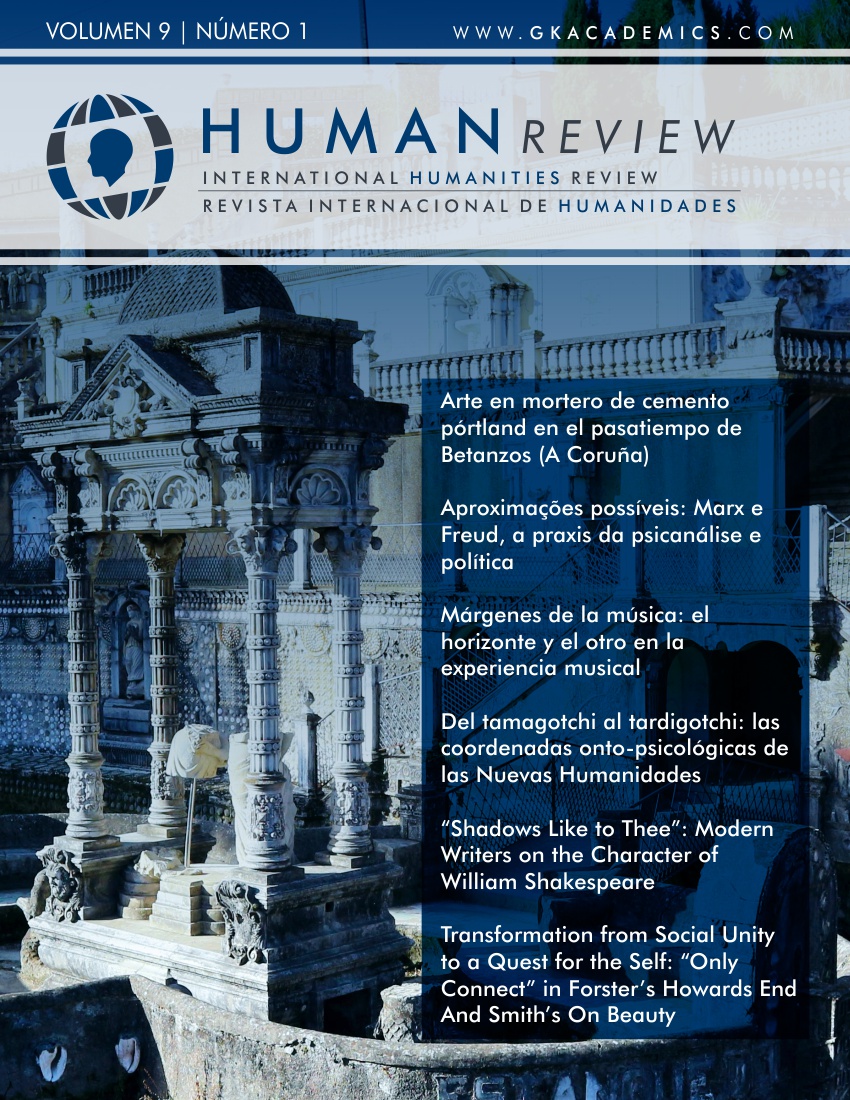“Shadows Like to Thee”: Modern Writers on the Character of William Shakespeare
DOI:
https://doi.org/10.37467/gka-revhuman.v9.2602Palabras clave:
William Shakespeare, plays, sonnets, portraiture, film, television, historical fictionResumen
A swarm of books boasting William Shakespeare as a central character have hit the bookstands in recent years. The question is, why? In some books, he is rather insipid, as if his brand is too hot to tamper with, and he is reduced to the status of a sacred cow. In other books, he is too busy fighting for truth and justice to be bothered with taking up the quill, while in others, he is an opportunistic “Shake-scene” who has no qualms about “beautifying” himself with his contemporaries’ feathers. I propose to look at such works in the aggregate and determine the basic physical and character traits that modern scribes attribute to our Will. My journey will take me primarily to novels (of the historical fiction school), but I shall be stopping along the way to consider works in other media, including a recent TV series, that also features the Bard. Among the novelists included in my study are Patricia Finney (The James Enys Mysteries), Rory Clements (The John Shakespeare Mysteries), Benet Brandreth (The William Shakespeare Mysteries), and Leonard Tourney (The Mysteries of Shakespeare).
Citas
Alberge, D. (2019, January 19). Mark Rylance takes on Shakespeare's establishment in authorship row. The Guardian. Retrieved from https://www.theguardian.com/culture/2019/jan/19/mark-rylance-takes-on-shakespeare-establishment-in-authorship-debate-over-francis-bacon
Bevington, D. M. (2010). Shakespeare and biography. Oxford: OUP Oxford. Retrieved from http://ezproxy.aud.edu/login?url=http://search.ebscohost.com/login.aspx?direct=true&AuthType=ip,url&db=nlebk&AN=381042&site=eds-live&scope=site
Bohm, I. (2015). Rival poet.
Branagh, K. (Director). (2019). All is true. Motion Picture (Trailer). United Kingdom: Sony Pictures Classic.
Brandreth, B. (2017). The assassin of Verona: A William Shakespeare Mystery. Zaffre.
Brandreth, B. (2016). The Spy of Venice: A William Shakespeare mystery. London: Twenty7 Books.
Burgess, Anthony (2002). Nothing like the sun: A story of Shakespeare’s love life. London: Allison & Busby Classics.
Clements, R. (2014). The Queen’s man: A John Shakespeare mystery. Witness impulse.
Cornwell, B. (2017). Fools and mortals. London: HarperCollins.
Cullingham, M. (Director). (1978, 13 June-18 July). Will Shakespeare. United Kingdom: ITV. [Television broadcast].
Duncan-Jones, K. (2015). Portraits of Shakespeare. Oxford: Bodleian Library.
Duncan-Jones, K. Shakespeare’s sonnets (2007). Reprint. London: Arden Shakespeare.
Duncan-Jones, K. An ungentle life (2010). London: Methuen Drama.
Finney, P. (2013). Do we not bleed?: The James Enys mysteries book 1. Kindle ed. Climbing Tree books.
Finney, P. (2017). Priced above rubies: The James Enys mysteries book 2. Climbing Tree Books.
Harper, K. (2010). Mistress Shakespeare. New York: New American Library.
Hotson, L. (1958). Shakespeare by Hilliard. Berkeley and Los Angeles, California: University of California Press.
Lipsey, M. (Director). (2016). Upstart crow [DVD]. United Kingdom: BBC [Television broadcast].
McKay, John (Director). (2005). A Waste of shame [DVD]. United Kingdom: BBC [Television broadcast.
Malcolm, M. L. (2018). Emilia. London: Oberon Books.
O’Reilly, S. (2014). Dark Aemilia. New York: Picador.
Strong, R., and V.J. Murrell (1983). Artists of the Tudor court: The portrait miniature rediscovered 1520-1620. London: Victoria & Albert Museum.
Sweeney, T. V. (2019, January). Review of The Spy of Venice: A William Shakespeare mystery. The New York Journal of Books. https://www.nyjournalofbooks.com/book-review/spy-venice
Tiffany, G. (2003). My father had a daughter: Judith Shakespeare’s Tale. New York: Berkeley.
Tourney, L. (2015). The conjurer’s daughter: A Shakespearean Murder Mystery. Endeavour Media.
Tourney, L. (2018). Falstaff’s murder: A mystery of Shakespeare. Kindle ed. Endeavour Media.
Tourney, L. (2018). Time’s fool. Endeavour Media.
Winfield, J. (2008). My Name is Will: A novel of sex, drugs, and Shakespeare. New York: Twelve.
Descargas
Publicado
Cómo citar
Número
Sección
Licencia
Aquellos autores/as que publiquen con esta revista, aceptan los términos siguientes:
- Los autores/as conservarán los derechos morales sobre la obra y cederán a la revista los derechos comerciales.
- Transcurrido 1 año desde su publicación, la versión del editor pasará a estar en acceso abierto en la web de la editorial, pero la revista mantendrá el copyright de la obra.
- En el caso de que los autores deseen asignar una licencia abierta Creative Commons (CC), podrán solicitarla escribiendo a publishing@eagora.org.








